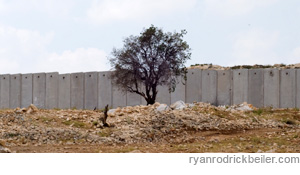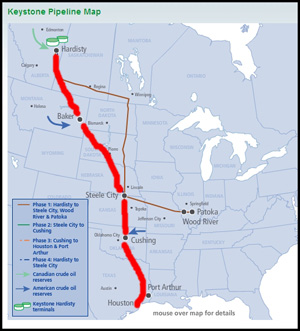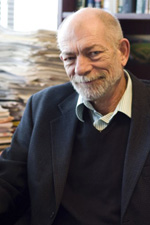Movement
Sojourners has always tried to understand and advocate for "biblical politics." But what does that mean now, especially as we approach another major election?
I was talking the other day to a Christian leader who has given his life to working with the poor. His approach is very grassroots -- he lives in a poor, virtually all-minority community and provides basic services for low-income people. He said, "If you work with and for the poor, you inevitably run into injustice." In other words, poverty isn't caused by accident. There are unjust systems and structures that create and perpetuate poverty and human suffering. And service alone is never enough; working to change both the attitudes and institutional arrangements that cause poverty is required.
I just returned from a very moving convocation at the Claremont School of Theology where I am on the faculty. We were celebrating the historic founding of a new interreligious theological university that brings together institutions representing the three Abrahamic faiths, along with our newest partner, the Jains. The Jains are an eastern religion founded in India over 2,500 years ago who are perhaps best known for their deep commitment to the concept of no-harm or ahimsa.
While each partner institution will continue to train religious leaders in their own traditions, the Claremont Lincoln University will be a space where future religious leaders and scholars can learn from each other and collaboratively seek solutions to major global issues that no one single religion can solve alone. The CLU's founding vision of desegregating religion was reflected in the extraordinary religious diversity present at the convocation held in a standing room-only auditorium. I sat next to a Jewish cantor and a Muslim woman who had tears flowing down her face as we listened to the prayers offered in all four religions along with a reflection from a Humanist speaker.
As of yesterday, more than 1,009 Americans have been arrested to bring national attention to the controversial Keystone XL pipeline. This is what church looks like. Liturgy means "the work of the people" in service of the common good.
If President Obama permits the Keystone pipeline, thousands more will sit on his doorstep and in front of bulldozers. This movement doesn't have money to match the influence of oil companies, lobbyists, or politicians with conflicts of interest, but we do have our bodies and we are putting them on the line.
Here are what people of faith -- Jews, Christians, Buddhists, Quakers, Unitarians, and more -- are saying about why they have been or will be arrested to stop the Keystone XL pipeline:
Each moment is pregnant with new possibilities waiting to be born, alive with new beginnings, God's secrets not yet heard, God's dreams not yet fulfilled. These were the thoughts that lodged in my mind as I meditated on Isaiah 48:6-8 this morning. So many good Christian people I talk to are afraid that their prayer life will become stale, their spiritual disciplines empty rituals. Some make this an excuse for their lack of discipline in prayer. And prayer does become stale and meaningless if we don't know how to stir our imaginations and awaken our creativity to new thoughts, new patterns and new possibilities for prayer.
Tools for prayer are creative opportunities not formulae for success
One of my greatest fears as I continue to share these tools for prayers is that some of my readers will see them as another formula that will make them more successful and more prayerful. Of course that is possible, but what I hope is that we will all see these as tools as ways to stir our imaginations and open our minds to new ways to express the prayers God has placed in our hearts, stimuli that awaken our creativity to the brand new possibilities of ways that God can speak to us, in us, and through us.
 "The man who can articulate the movements of his inner life," the late Christian apologist and author Henri Nouwen said, "need no longer be a victim of himself, but is able slowly and consistently to remove the obstacles that prevent the spirit from entering."
"The man who can articulate the movements of his inner life," the late Christian apologist and author Henri Nouwen said, "need no longer be a victim of himself, but is able slowly and consistently to remove the obstacles that prevent the spirit from entering."
Throughout the ages, how Christian believers have chosen to articulate their inner lives has had many manifestations in literature, music, architecture, and other artistic endeavors.
As a means of communicating and wrestling with his inner life -- his journey of faith -- Greg Fromholz, an American expatriate youth worker for the Church of Ireland in Dublin, wrote a book titled Liberate Eden, but traditional publishing houses found that his work was a bit too iconoclastic for their tastes.
"It is just too different to be Christian," one publisher pronounced.
The forthcoming dedication of the national memorial monument honoring Rev. Dr. Martin Luther King, Jr., affords an opening for considering the complexity and meaning of his leadership. He was not the tamed and desiccated civil hero as often portrayed in the United States around the time of his birthday, celebrated as a national holiday. He was until the moment of his death raising issues that challenged the conventional wisdom on poverty and racism, but also concerning war and peace.
King was in St. Joseph's Infirmary, Atlanta, for exhaustion and a viral infection when it was reported that he would receive the 1964 Nobel Peace Prize. As Gary M. Pomerantz writes in Where Peachtree Meets Sweet Auburn, this was the apparent cost exacted by intelligence surveillance efforts and the pressures of learning that Attorney General Robert F. Kennedy had formally approved wiretaps by the Federal Bureau of Investigation. His evolving strength as a leader is revealed in his remarks in Norway that December, which linked the nonviolent struggle of the U.S. civil rights movement to the entire planet's need for disarmament.
It was over in less than a minute. Three miles below the surface of the earth near a town in Virginia called Mineral, a fault line shifted. As a result, a 5.8 magnitude earthquake was felt from Georgia to New England and as far west as Detroit. The National Cathedral lost several stone spires, the Washington Monument cracked, and Sojourners' office was closed for the afternoon, as our building was checked for structural damage.
Tectonic plates move beneath our feet in the part of the globe that scientists refer to as the lithosphere. Over the course of a year, an average plate will move as little as 3 to 6 centimeters. The speed of their movement is 10,000 times slower than the hour hand on a clock and even slower than the rate of growth of human hair. For decades, sometimes centuries or millennia, a plate's movement might go almost entirely unnoticed. Then, in less than a minute, the world shakes and everything changes.
When it comes to homeless youth the facts are simple, services in the City of Chicago are falling far behind the need. A survey of Chicago public school students from 2009/10 revealed 3,682 children who identified as being homeless and in need of shelter. In contrast there are approximately 189 beds for homeless youth (ages 18-25) funded by the City of Chicago. In 2010, 4,775 homeless youth were turned away from youth shelters for lack of room. To be clear, that was 4,775 instances where homeless youth sought shelter and were unable to find it. To date there are only 10 percent of the beds needed to provide safe shelter and supportive programs for the estimated number of Chicago's homeless youth.
 Whenever I give talks on the effects of the Israeli occupation on Palestinian livelihood, the status of nonviolence as a means to resisting the occupation, and how I believe nonviolence is the only way to move forward to resolve the conflict and create a lasting peace between Israelis and Palestinians, one of the first and immediate questions I get from foreign visitors to my office in Bethlehem is, What you said is good, but what about the Muslims? Do they also believe in nonviolence? Do they understand it?" Even if I don't mention religion in my presentation -- and I rarely do -- this question always seems to make its way in our discussions.
Whenever I give talks on the effects of the Israeli occupation on Palestinian livelihood, the status of nonviolence as a means to resisting the occupation, and how I believe nonviolence is the only way to move forward to resolve the conflict and create a lasting peace between Israelis and Palestinians, one of the first and immediate questions I get from foreign visitors to my office in Bethlehem is, What you said is good, but what about the Muslims? Do they also believe in nonviolence? Do they understand it?" Even if I don't mention religion in my presentation -- and I rarely do -- this question always seems to make its way in our discussions.
The debate we have just witnessed has shown Washington, D.C. not just to be broken, but corrupt. The American people are disgusted watching politicians play political chicken with the nation's economy and future. In such a bitter and unprincipled atmosphere, whoever has the political clout to enforce their self-interest and retain their privileges wins the battles. But there are two casualties in such political warfare: the common good and the most vulnerable.
So how will vulnerable people fair under this deal? "The Circle of Protection," a diverse nonpartisan movement of Christian leaders, has been deeply engaged in the budget debate to uphold the principle that low-income people should be protected. But it is hard to evaluate a deal that averts a crisis when the crisis wasn't necessary in the first place. Over the past few weeks, our economy has indeed been held hostage as politicians negotiated the price of the release. Ultimately, I think most of us wish that no hostages had been taken in the first place, and this was no way to run a government or make important budget decisions.
 President Barack Obama will decide as early as September whether to light a fuse to the largest carbon bomb in North America. That bomb is the massive tar sands field in Canada's Alberta province. And the fuse is the 1,700-mile long Keystone XL Pipeline that would transport this dirtiest of petroleum fuels all the way to Texas refineries.
President Barack Obama will decide as early as September whether to light a fuse to the largest carbon bomb in North America. That bomb is the massive tar sands field in Canada's Alberta province. And the fuse is the 1,700-mile long Keystone XL Pipeline that would transport this dirtiest of petroleum fuels all the way to Texas refineries.
The Keystone XL Pipeline is a climate and pollution horror beyond description. From August 20 to September 3, thousands of Americans -- including Bill McKibben, Danny Glover, NASA's Dr. James Hansen, and thousands more -- will be at the White House, day after day, demanding Obama reject this tar sands pipeline.
I'm going to be there, and I hope you will join me -- we need your voice.
John Stott died this Wednesday. He was 90 years old. What many people don't understand is that he was the most influential 20th-century evangelical leader in the world, with the exception of Billy Graham. Stott became the Anglican rector of All Souls Church in downtown London at the age of 29 in 1950, and he stayed there for his entire ministry. But from his parish at Langham Place in the city's West End, and right across from BBC headquarters, John Stott spoke to the world with 50 books that sold 8 million copies. He also traveled the globe , speaking, teaching, convening, mentoring, and bird watching -- a personal passion.
Perhaps the most telling thing about this man is all the personal stories about "Uncle John" that the world is now hearing, from many Christian leaders around the world who were profoundly influenced, encouraged, and supported by John Stott. And secondly, how such a giant in the Christian world remained so humble, as testified to by those who knew him who say how "Christ-like" he was.
!['Civil Rights March on Washington, D.C. [Dr. Martin Luther King, Jr., President of the Southern Christian Leadership Conference, and Mathew Ahmann, Executive Director of the National Catholic Conference for Interrracial Justice, in a crowd.], 08/28/1963' photo (c) 1963, The U.S. National Archives - license: http://www.flickr.com/commons/usage/](http://lh3.ggpht.com/-XUAmAA_vWKI/Ti7l4ZavSOI/AAAAAAAACS8/0Y0EfQ03QzA/Flickr-4101511358.jpg) How should music rank among the ever-growing list of time-tested nonviolent methods such as boycotts, marches, strikes, sit-ins, and vigils?
How should music rank among the ever-growing list of time-tested nonviolent methods such as boycotts, marches, strikes, sit-ins, and vigils?
Anthony Shadid of the New York Times reports that a song, "Come on Bashar, Leave," is spreading across Syria, boldly calling on President Bashar al-Assad to step down. (Bryan Farrell also wrote about it at the Waging Nonviolence blog.) The article suggests that a young cement layer who chanted it in demonstrations was pulled from the Orontes River this month, his throat having been cut, and, according to residents of the city of Hama, his vocal chords torn out. Hama is where, in 1982, then-president Hafez al-Assad, father of the current president named in the song, gave orders to the army to massacre more than 10,000 in putting down an Islamist upheaval. Today, boys 6-years-old and older vocalize their own rendition of the original warbler's song instead. As the song has sped across Syria, demonstrators have adopted it for themselves.
There's something special about the bookends of our lifetimes. I became a first-time father seven months ago and a hospice chaplain just one month past. Growing up and growing old, especially the first and last months of our lives, can be surprisingly similar experiences.
I fed my daughter sweet potatoes for the first time last night. Introducing her to solid foods has been a treat. While we're trying our best to teach her the sign language words for "food", "more", and " all done", Robin still finds closed-mouth grumble-whines to be the best way to let us know she thinks sweet potatoes aren't all that hot. Another subtly nuanced whine might instead wonder, "You don't happen to have any more mashed banana or applesauce around, would you?" My attempt to turn the filled spoon into an acrobatic and roaring airplane met with scant success.
Shakespeare said a rose by any other name would smell as sweet. Maybe, but a Stink Rose by any other name (say... garlic?) might get more play.
On July 19, Campus Crusade for Christ announced its plan to officially change its name to Cru in early 2012.
Brown v. Board of Education had not yet been fought in the Supreme Court when Bill and Vonetta Bright christened their evangelical campus-based ministry Campus Crusade for Christ in 1951. The evangelical church context was overwhelmingly white, middle class, and suburban. The nation and the church had not yet been pressed to look its racist past and present in the face. The world had not yet been rocked by the international fall of colonialism, the rise of the Civil Rights movement, the disillusionment of the Vietnam War, the burnt bras of the women's liberation movement, the fall of the Berlin Wall, or the rise of the Black middle class (more African Americans now live in the suburbs than in inner cities). In short, theirs was not the world we live in today. So, the name Campus Crusade for Christ smelled sweet. Over the past 20 years, though, it has become a Stink Rose ... warding off many who might otherwise have come near.
 My office has two overflowing bookshelves, with more books stacked on top and on the windowsill. But above my desk within easy reach is a small shelf. On it I keep those books I most regularly use in thinking and writing. Here are the top 10.
My office has two overflowing bookshelves, with more books stacked on top and on the windowsill. But above my desk within easy reach is a small shelf. On it I keep those books I most regularly use in thinking and writing. Here are the top 10.
1. The Bible: What can I say about the foundational source of God's guidance in everything? I read or refer to it nearly every day. It was given to us "for teaching, for reproof, for correction, and for training in righteousness" (2 Timothy 3:16).
2. The Book of Common Prayer: I am not Anglican/Episcopalian, but there is something in the formal prayers of the traditional liturgy that resonate with my soul. On those days I really don't feel like praying or can't find the words, it's comforting to have a place to turn for inspiration.
Today is another intense day of politics at the White House. The debt default deadline is fast approaching. The stakes for the nation are high as politicians can't agree on how to resolve the ideological impasse on how to reduce the deficit before the nation defaults on its financial obligations.
Yesterday, before Congressional leaders were due at the White House for critical negotiations, I, along with 11 other national faith leaders, met with President Obama and senior White House staff for 40 minutes. We were representing the Circle of Protection, which formed in a commitment to defend the poor in the budget debates. Sitting in the Roosevelt Room of the White House, we opened in prayer, grasping hands across the table, and read scripture together. We reminded ourselves that people of faith must evaluate big decisions on issues like a budget by how they impact the most vulnerable.
After months of good-faith reforms and patience, the drama is back in Egypt's Tahrir Square as protesters are preparing for a potential showdown with the state's military rule. The movement, among other things, is demanding an end to military rule -- a more radical call that reflects both the frustration with the status quo and the hope for a better way.
Two weeks ago, at the "Day of Persistence," Egypt saw its largest resurgence of public protest since former President Hosni Mubarak was ousted in February. The nation-wide protests show Egyptians camping out in Cairo's Tahrir Square, staging sit-ins and blocking traffic in Alexandria, and threatening to shut down Suez's tunnel access to Sinai. So why are the people confronting -- albeit nonviolently -- an interim government that has promised elections and a new constitution? A glance at the collective demands drafted in Tahrir Square make clear that the movement's demands -- both political and economic -- have not progressed much under the military rule of the Supreme Council of the Armed Forces.
After having spoken at the Greenbelt Festival in England a number of times now, we at the Center for Action and Contemplation always hoped and planned that we create a similar festival for spirituality and the arts in the United States. We had nothing comparable, and it was a niche waiting and needing to be filled. Therefore, we were honored to be a part of the first Wild Goose Festival in North Carolina last June, and hope that we can convene a truly ecumenical, radical, and socially engaged crowd of people living at the intersection of justice, spirituality, and creativity -- and those who want to be!

This comes after a Supreme Court decision in May that ordered California to reduce its prison population, as overcrowding was causing "needless suffering and death."
Part of what's making the standoff worse is the belief that the strike is, in essence, a form of gang activity. For one thing, as Colin Dayan noted in passing in a New York Times op-ed, "How they have managed to communicate with each other is anyone's guess." The California Department of Corrections and Rehabilitation (CDCR), though, isn't so stumped.